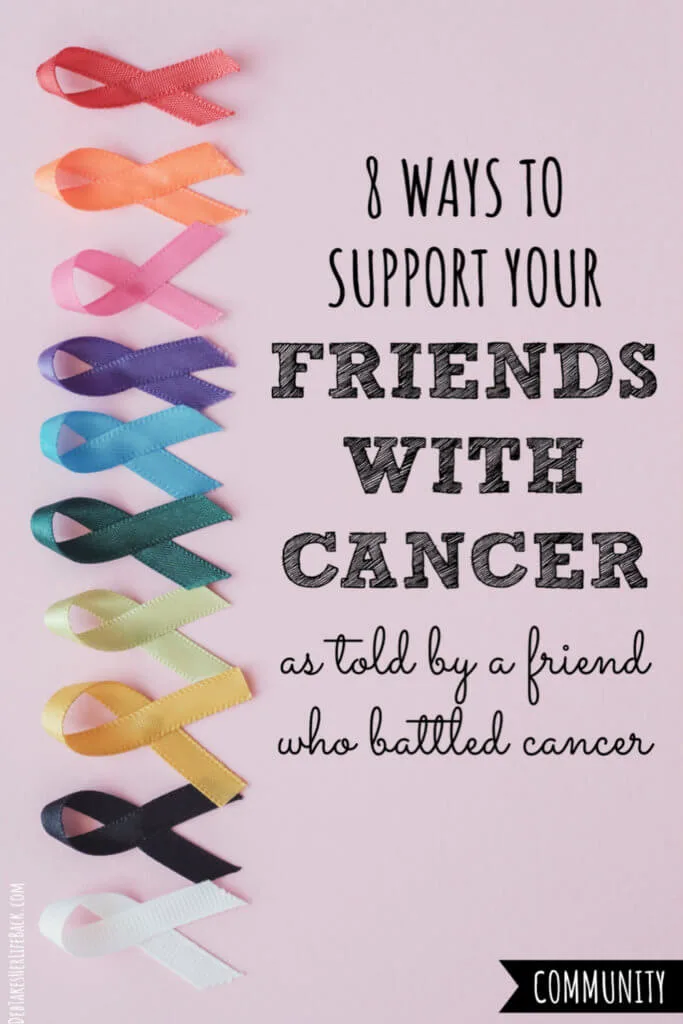Almost all of us have friends with cancer.
Did you know that 39.6% of us will be diagnosed with cancer at some point in our lives? With statistics like that, the chances are good that you have a friend battling cancer right now. I have several. So how can we help and support our friends with cancer?
I’ve struggled to know what to do and say, and what not to do and say.
Can I ask how they’re doing?
Do they even want to talk about their illness?
What’s the best way to support them?
I’ve done my best and hoped that my intentions came across, even if I didn’t do the “right” thing.
A huge part of community, of doing life together, is supporting our friends. So I asked a friend who battled cancer if she would be willing to provide any guidelines for those of us who aren’t sure of how best to support our friends with cancer. She was gracious enough to provide some advice based on her own experience.
I’m simply paraphrasing her and don’t intend to come across as thinking myself an expert. I am certainly no expert. I’m just hopeful we can all better support our friends.

Ask how they’re doing, but don’t make it the focus of every conversation.
Not asking can make it seem like you don’t care. Also asking them about aspects of their life unrelated to their illness, or talking about your life, can help to inject a little “normal” back into their world.
Don’t avoid them because it’s difficult or uncomfortable for you.
Your friend’s life is currently difficult and uncomfortable. And having a friend vanish without a word isn’t going to help. If you don’t feel comfortable talking in person or over the phone, send a card or email.
If it’s too difficult to write a personal note, buy a card with a prewritten message. Just signing your name to a “Thinking of You” card can express your support.
Even if you haven’t spoken to them in years, an encouraging comment on a social media post can mean a lot!
Remember that their caregivers need support too!
We expect those facing an illness to be weak or break down at times, but caregivers (spouses, parents, etc.) may need a chance to break down too!
They may not feel able to express their exhaustion or frustration to their family member fighting the illness, because they’re supposed to be playing the part of a strong support system. Recognize their needs as well and ask how you can help.
Be specific when you offer help.
If you say, “Let me know if I can do anything,” your friend will appreciate your support, but may not feel comfortable making a specific request.
Ask if you can bring over dinner, watch their kids, drive them to an appointment, or clean their house. It makes your offer feel more genuine, which will help your friend to feel more comfortable accepting your help.

Think before you ask or speak about their illness.
Avoid being blunt. Imagine how they might be feeling about the details you’re discussing.
Consider how many times your friend has likely been asked and answered that same exact question. Adjust your approach to add some empathy and to be considerate of those feelings.
Be positive.
Your friend is battling a life-threatening illness. (a) Your headache or diet woes likely seem pretty bearable to them in comparison. (b) They don’t need to hear about more problems.
It’s not that they believe your personal struggles aren’t important. They’re just trying their darnedest to catch some positive vibes from others. So learn and perfect how to become an optimist and send out those positive vibes!
Don’t stop supporting them when the major battle is over.
Many people rally around their friends with cancer as they’re facing treatments, but assume their support is no longer needed when treatments are over. Your friend might now be battling side effects, follow-up scans and appointments, and/or depression.
Don’t let them think they’ve been forgotten! They may even need your support more now, since many of their other friends have likely moved on.
Be considerate of “normal” things that might now be a challenge.
Your friend probably wants to hang out and enjoy your company, but they might not feel up to going out for drinks like you used to. They may tire easily, struggle with their new body image, or have to navigate new dietary restrictions.
They may feel bad about their new “normal” and agree to activities simply because you suggested it and they don’t want to let you down. Thinking ahead and offering a more appropriate activity can make a world of difference.

You can make a world of difference for your friends with cancer. So do it!
Cancer is a very scary diagnosis, both for those diagnosed and their loved ones. If your friend has been diagnosed with cancer, please be sure to ask how they and their caregivers are doing and specifically how you can help.
Be considerate when you discuss their illness and take their new “normal” into account before making plans together. Stay positive for them and remember that they need support even after their treatments are over.
Many, many thanks to my friend for sharing her insight! I know I’ll be putting these guidelines to immediate use.
Did we miss anything? If you’ve been battling cancer or another life-threatening disease and would like to share additional advice, please, please do so in the comments!
Cancer is a heavy weight to bear, but we can help to lighten the load for our friends if we all lift together.

P.S. Ready to break up with stress? Our free guide is chock-full of crucial info and practical tips, plus links to helpful apps, posts, and other fantastic resources! Nab it here today!
Disclosure: While all opinions are our own, we are a participant in the Amazon Services LLC Associates Program and other affiliate advertising programs, designed to provide a means for us to earn fees by linking to Amazon.com and affiliated sites, at no additional cost to you.



